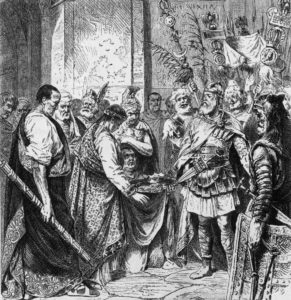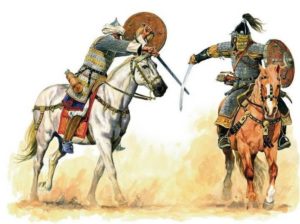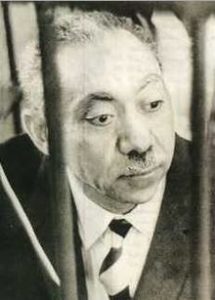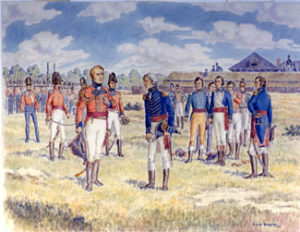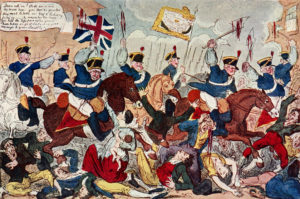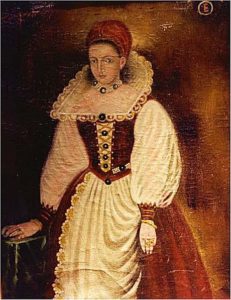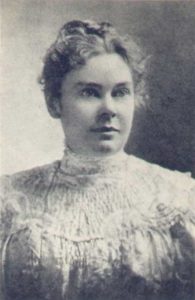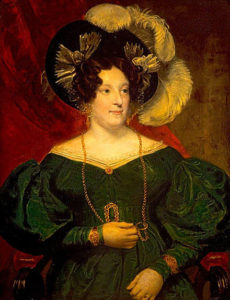
1821
London riots over the body of Caroline of Brunswick
Caroline Amelia Elizabeth of Brunswick-Wolfenbütte (1768-1821) was a German princess who married George, Prince of Wales in 1795 and became Queen of England when her husband ascended the throne of England as George IV. George, ruling his country as Prince Regent during the madness of his father George III, was not a popular figure. He was perpetually in debt, had secretly (and illegally) married a Catholic woman, and was despised by the populace for his incompetence and arrogance. Consequently, when George openly shunned his wife for being fat and vulgar, she became a favourite of the lower classes of London. After the birth in 1796 of their daughter Charlotte, George had little to do with his wife and restricted her access to their child. In 1806 he appointed a commission to investigate rumours that she had taken a lover and produced an illegitimate offspring; she was found to be innocent and her popularity grew. Since she could not obtain a divorce from the Prince, she moved to Italy, where more rumours originated claiming that she was having an affair with one of her servants. George tried to get Parliament to pass a bill divorcing her for adultery but public sentiment forced the bill to be dropped. She returned to England after the death of her child but was still persona non grata at court. When George III died, she was forbidden to attend her husband’s coronation. She died soon after and the removal of her body to her homeland where she wished to be buried prompted the following disturbances, recounted by a contemporary observer.
Tuesday, the 14th August 1821, presented a singular scene of commotion in London. That day had been fixed by the authorities for the removal of the remains of Queen Caroline from Brandenburgh House, where she had expired a week previously, to Harwich, for the purpose of embarking them there for the continent, in terms of the instructions contained in her own will, which directed that her body should be deposited among those of her ancestors at Brunswick. A military guard had been provided by government for the funeral cortege; but, with the view of avoiding as much as possible, in the circumstances, any popular demonstrations, it was resolved that the procession should not pass through the city, a determination which gave the greatest offence both to the queen’s executors and a large portion of the community at large. According to the prescribed route, the procession was to go from Hammersmith, through Kensington, into the Uxbridge Road, then down the Edgeware Road, into the New Road; along the City Road, Old Street, and Mile-end to Romford; and thence through Chelmsford and Colchester to Harwich.
On the appointed day, an immense crowd congregated about Hammersmith, though the rain was falling in torrents. On the funeral reaching the gravel-pits at Kensington, and proceeding to turn off to the left, the way was blocked up with carts and wagons, to prevent further advance towards the Uxbridge Road, and the procession, after halting for an hour and a half, was compelled to move on towards London. Arriving at Kensington Gate, an attempt was made by the head of the police force, Sir R. Baker, with a detachment of Life Guards, to force open the park-gates, but in vain, the crowd, which had already given way to many hostile demonstrations, shouting loudly all the while: ‘To the City—to the City!’ Hyde Park Corner being reached, the gate there was found barricaded, and the procession moved up Park Lane, but was shortly met by similar obstructions. It then returned to the Corner, where the soldiers had, in the meantime, succeeded in clearing an entrance, and made its way through Hyde Park. On reaching Cumberland Gate, this was found closed, and a furious conflict ensued with the mob, who hurled at the troops the stones of the park-wall, which had been thrown down by the pressure of the crowd.
Many of the soldiers were severely hurt, and their comrades were provoked to use their firearms, by which two persons were killed and several wounded. After some further clearing away of obstructions, the procession moved down the Edgeware and along the New Roads till it reached the Tottenham Court Road, where the mob made so determined a stand against it proceeding further in the prescribed direction, that Sir R. Baker deemed it most advisable to turn the cortege down the Tottenham Court Road, and thence by Drury Lane through the Strand and the City. So resolute was the popular determination to compel the procession to traverse the city, that every street, including Holborn, through which a detour could have been made to reach the New Road or the City Road, was carefully blocked up and rendered impassable.
Having emerged from the City, the funeral train proceeded quietly on its way to Chelmsford, where it arrived at two o’clock on the following morning. From Chelmsford it proceeded to Colchester, and thence to Harwich, where it embarked for the continent on the evening of the 16th. The remains reached Brunswick on the 24th, and were deposited the following day in the cathedral, in the vault of the ducal family. An inscription had been directed by the deceased to be placed on her coffin in the following terms ‘Here lies Caroline of Brunswick, the injured Queen of England,’ but the British authorities refused to allow this to be done. While the coffin, however, was lying at Chelmsford, on its way to the coast, the queen’s executors affixed to it an engraved plate with the obnoxious title, but it was discovered, and removed by the authorities in charge, notwithstanding a vehement protest from the other party. Thus closed the tomb on this unfortunate queen, whom, even after death, the storms which had visited her so fiercely while in life, did not cease to pursue.
